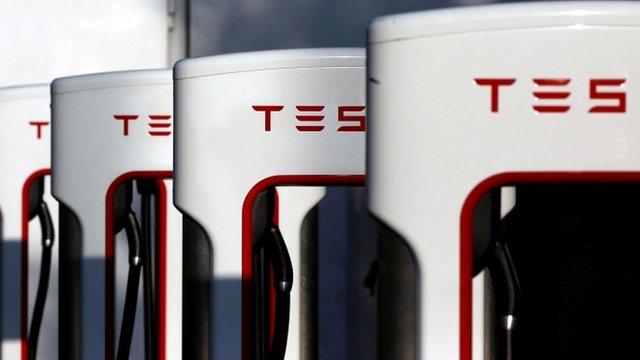The battery battle hots up
- Published

A Galaxy Note 7 reportedly caught fire shortly after its charger was unplugged
Batteries are hot right now - literally in the case of Samsung's Galaxy Note 7.
The investigation into what caused the overheating in the smartphone concluded, unsurprisingly, that it was a fault in the design and manufacturing of the batteries.
But what also emerged was the growing pressure to deliver ever more from a smartphone within a confined space with Samsung's DJ Koh admitting that the company might have been asking too much of the battery.
That pressure will not lessen, either in the smartphone industry or in a range of others dependent on stored energy. If there's one area of technology where most consumers would like to see progress, it's in battery performance.
Whether it be in giving electric cars a greater range or in storing solar energy during the day for use in homes overnight, the race is on around the world to invent better batteries.
Sleeping power
In the UK, the business secretary Greg Clark made clear in an interview on the Today programme that he thought battery technology was a key area where scientists and businesses could give the country a competitive advantage.
I wondered whether the UK was quite as strong in this technology as he claimed but, having asked on Twitter for examples, it does seem that we have plenty of expertise, although much of it is still at the research stage rather than being reflected in products reaching consumers.
One exception is a company called Moixa, external which is installing smart batteries in homes with the promise that customers can cut bills by storing energy. So far, its product is in just 700 homes but its chief executive Simon Daniel is nothing if not ambitious.
"We are like a mini-Tesla," he told me. "Our ambition is to be in one million homes." He claims that could save consumers £8bn a year and transform the way the power grid operates, dealing with the intermittent nature of wind and solar power.
And he's bullish about the wider battery research landscape: "The UK is definitely well ahead in battery tech - we have massive leadership in chemistry innovation, and are very good at power engineering in terms of systems, and in business models."

Moixa aims to put batteries in homes to cut bills by storing energy
In terms of that chemistry innovation, there are promising advances emerging from a number of British universities. A collaboration between the universities of Surrey and Bristol and a company called Augmented Optics has developed a supercapacitor which scientists say could be up to 10,000 times more powerful than existing battery technology.
"You could drive from London to Edinburgh, have a cup of coffee while the car recharged, then drive back," says Dr Brendan Howlin, explaining the potential of this breakthrough.
Dr Howlin, senior lecturer in Computer Aided Chemistry at Surrey University says it is vitally important that projects like this make progress now. He says battery technology - at least in terms of what is available to consumers - has not advanced much in the last decade. "We need a product that charges quickly and discharges slowly."
He estimates that the supercapacitor idea may take another five years to make an impact on our lives, with lots of new infrastructure in terms of charging stations needed to make it viable.
There are other projects in the UK - Nissan's Sunderland plant will be producing batteries for electric vehicles, and Dyson plans to invest £1bn in developing new battery technology by 2020.

Quick-charging car batteries are a must for electric cars
The one area where we don't excel, according to Simon Daniel at Moixa, is in providing the finance for small companies to scale up and take on the world. He says Silicon Valley doesn't have the same strength in battery research as the UK "but they are faster at getting it out of the labs."
He is confident that the government's new industrial strategy will address this issue.
But around the world, companies and governments with deep pockets are investing heavily in battery technology that could transform many areas of our lives. The UK will need to move faster to turn some brilliant research into world-beating products.
- Published23 January 2017

- Published18 January 2017

- Published2 September 2016

- Published16 January 2017
